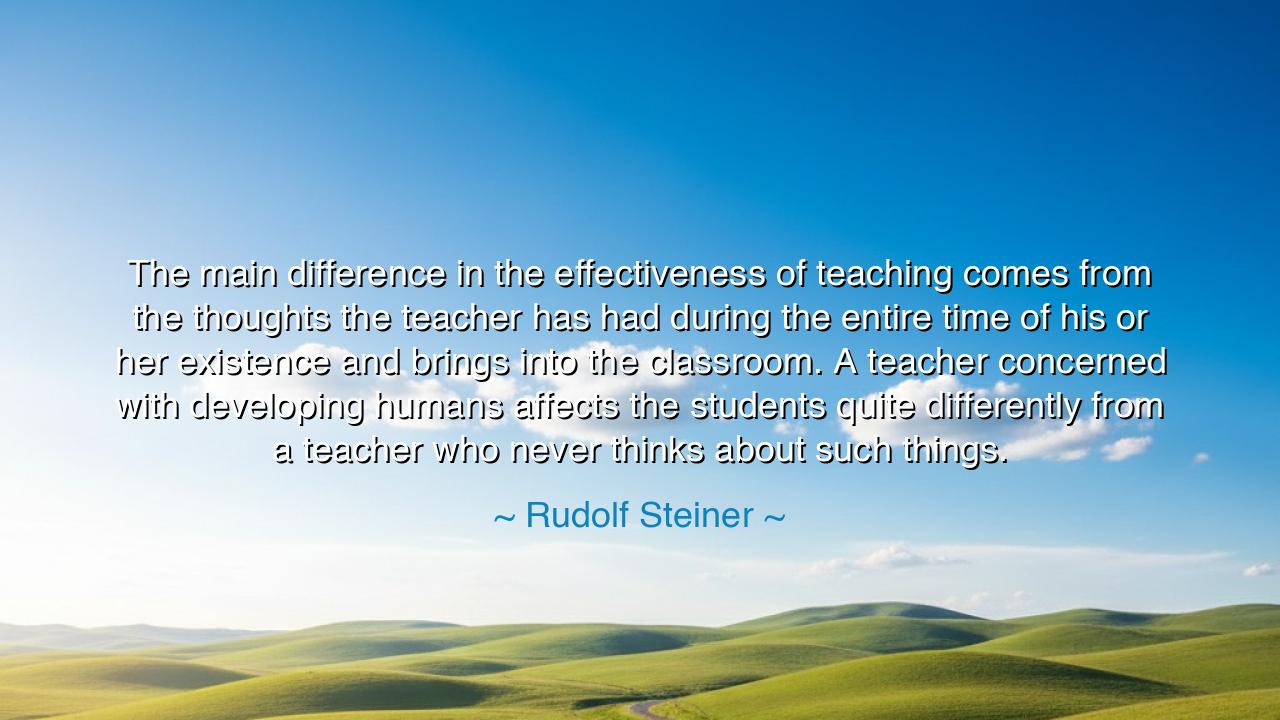
The main difference in the effectiveness of teaching comes from
The main difference in the effectiveness of teaching comes from the thoughts the teacher has had during the entire time of his or her existence and brings into the classroom. A teacher concerned with developing humans affects the students quite differently from a teacher who never thinks about such things.






Rudolf Steiner, philosopher, mystic, and founder of Waldorf education, once declared: “The main difference in the effectiveness of teaching comes from the thoughts the teacher has had during the entire time of his or her existence and brings into the classroom. A teacher concerned with developing humans affects the students quite differently from a teacher who never thinks about such things.” These words do not speak merely of methods or techniques, but of the very soul of the teacher. For Steiner saw that what lives within a guide—their reflections, their struggles, their vision of humanity—radiates into every lesson, whether spoken or unspoken.
O listener, understand this wisdom: a teacher is not only a dispenser of knowledge but a vessel of lived thought. The thoughts accumulated across a lifetime—whether of compassion, curiosity, reverence, or indifference—flow invisibly into the classroom. A teacher who has pondered the mystery of the human spirit teaches differently than one who has only memorized formulas and rules. One awakens the whole being of the student, the other merely fills the mind with fragments. Steiner’s words reveal that education is not a transfer of information but the passing of inner life.
Consider the story of Socrates, who never wrote a single book, yet transformed Athens through conversation. His power did not lie in polished lectures or memorized texts but in the thoughts he had wrestled with—questions of virtue, justice, and truth. When he spoke with young men in the marketplace, they felt his burning concern for the soul. Compare him to the countless teachers of his day who taught only rhetoric for pay, never reflecting deeply on life. Those men passed into obscurity, but Socrates’ influence endures across millennia. Thus we see the truth of Steiner’s words: the difference lies not in skill alone, but in the inner life of the teacher.
History also shows us the opposite. There have been classrooms where knowledge was delivered with precision, yet no warmth or humanity lived in the room. Children may have learned to read or calculate, but they were left hollow, uninspired, untouched by the flame of meaning. And there have been others, poor in resources but rich in spirit, where a teacher who had thought deeply about life stirred the souls of students toward greatness. Consider Anne Sullivan, who guided Helen Keller. She was not merely trained in methods; she had lived through hardship, and her reflections on perseverance and human dignity infused every lesson. That inner life made all the difference.
The origin of Steiner’s statement comes from his philosophy of anthroposophy, where he believed that education must serve the whole human being—body, soul, and spirit. For him, the teacher was not only an instructor but a moral and spiritual guide, someone who had the sacred duty of awakening the humanity of the child. To neglect this was to reduce education to machinery, a soulless exercise. To embrace it was to honor the child as a being of destiny, full of potential to shape the world.
The lesson for us, then, is both humbling and inspiring: if you are a teacher, cultivate not only your knowledge but your inner life. Reflect on what it means to be human. Ponder the mysteries of love, freedom, suffering, and joy. For what you have thought and lived becomes the hidden curriculum, more powerful than any textbook. And if you are a student, seek out those whose concern is not only for your grades but for your growth as a human soul.
Therefore, children of tomorrow, take heed: true teaching begins long before the classroom. It begins in the thoughts carried through a lifetime, in the reflections made during solitude, in the compassion nurtured through hardship. Let your teachers be those who think deeply of what it means to be human, and let your own path be one of reflection, so that one day, should you teach, you too may bring into the world not only knowledge, but wisdom.
For in the end, Steiner’s wisdom burns like a beacon: the greatness of a teacher is measured not by the words spoken, but by the depth of life that stands behind them. To awaken the human in another, one must first have awakened it within oneself. And this is the sacred task, the eternal work, of all who guide the young.






AAdministratorAdministrator
Welcome, honored guests. Please leave a comment, we will respond soon